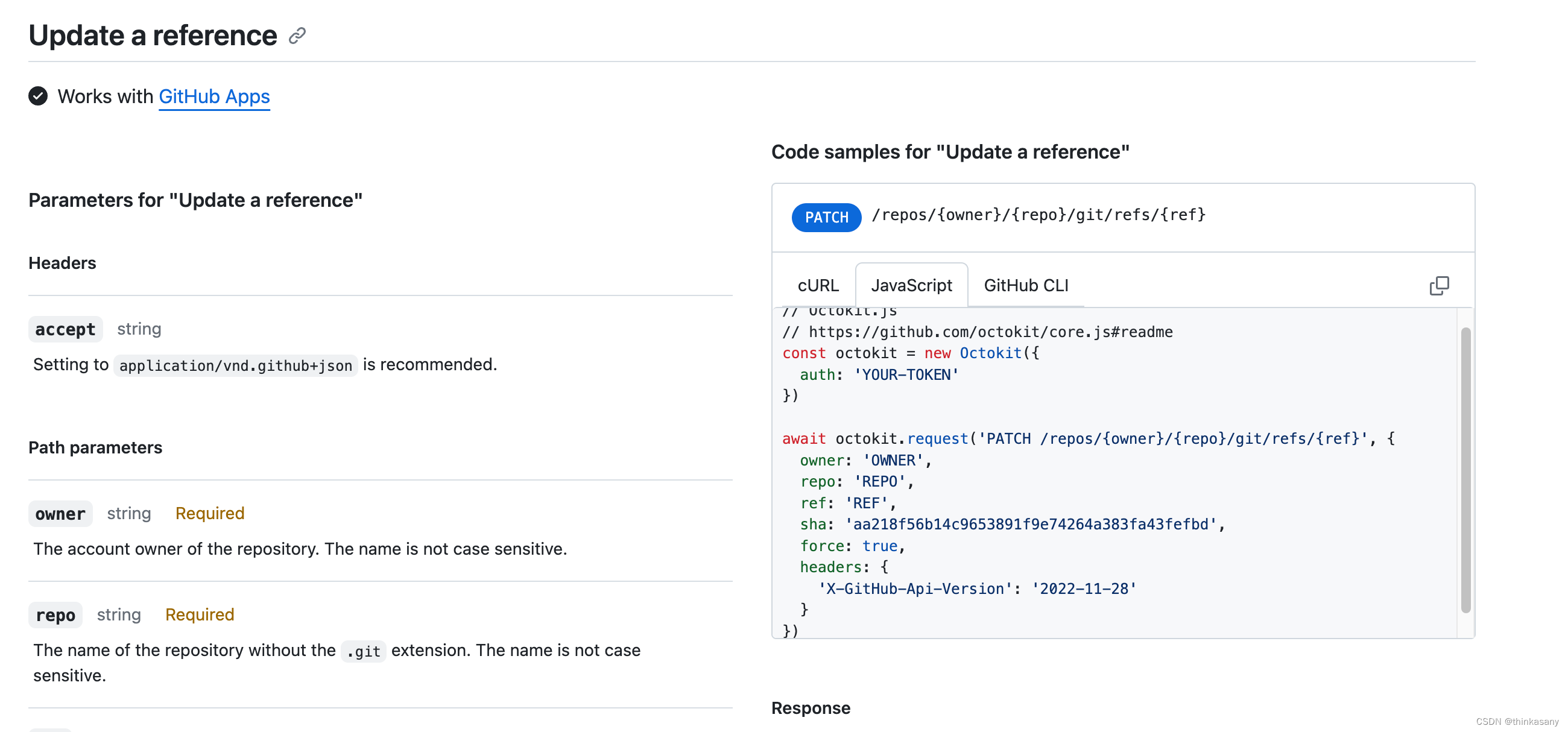通过这篇文章你可以掌握如何将github action 环境下临时生成的文件推送至指定分支,并且可以打开利用github开放的api做各种强大或有趣的事情的视野和思路。
如果你对github-action感兴趣,还可以看这篇文章, 这篇文章教会你如何开发Github Action,并且让你明白它是什么,怎么用,如何做到的。如何开发一个action
如何将临时生成的文件推送至指定分支
- 场景分析
- 核心代码
- 检查action 运行的历史
- 前置知识
- 开发步骤详解
- 1. 获取特定分支的最后一次提交 SHA
- 2. 创建 Blobs(base64 编码)
- 3. 创建一个定义了文件夹结构的树
- 4. 创建提交
- 5. 更新分支引用
- 最后
场景分析
- 问题:什么时候需要这样子的功能?
- 解答:当时我开发社区贡献统计Action的时候,会生成一个svg图片,但是为了让更多人能够复用这个工具,又节约一笔服务器的运营成本。
核心代码
先抛出全部代码,然后在后续把这段代码的实现讲清楚。
try {// 1. 获取特定分支的最后一次提交 SHAconst branchResponse = await Axios.get(`/branches/${branch}`);const lastCommitSHA = branchResponse.data.commit.sha;console.log("lastCommitSHA", lastCommitSHA);// 2. 创建 Blobs(base64 编码)const createBlob = async (content, encoding) => {const blobResponse = await Axios.post("/git/blobs", {content: content,encoding: encoding});return blobResponse.data.sha;};const jsonSHA = await createBlob(Buffer.from(JSON.stringify(contributors)).toString("base64"),"base64");const pngSHA = await createBlob(imageContent.toString("base64"), "base64");// 3. 创建一个定义了文件夹结构的树const createTree = async (baseTreeSHA, blobs) => {const tree = blobs.map(blob => {return {path: blob.path,mode: "100644",type: "blob",sha: blob.sha};});const treeResponse = await Axios.post("/git/trees", {base_tree: baseTreeSHA,tree: tree});return treeResponse.data.sha;};const treeSHA = await createTree(lastCommitSHA, [{ path: pngPath, sha: pngSHA },{ path: jsonPath, sha: jsonSHA }]);console.log("treeSHA", treeSHA);// 4. 创建提交const createCommit = async treeSHA => {const commitResponse = await Axios.post("/git/commits", {message: commitMessage,author: {name: committerName,email: committerEmail},parents: [lastCommitSHA],tree: treeSHA});return commitResponse.data.sha;};const newCommitSHA = await createCommit(treeSHA);// 5. 更新分支引用await Axios.patch(`/git/refs/heads/${branch}`, {sha: newCommitSHA});} catch (error) {console.log("遇到错误", error);}检查action 运行的历史
历史信息地址

前置知识
每一个接口都可以翻阅文档来查看参数配置。
https://docs.github.com/en/rest/git/refs?apiVersion=2022-11-28 以下两种接口的写法是等价的。
以下两种接口的写法是等价的。
await octokit.request('PATCH /repos/{owner}/{repo}/git/refs/{ref}', {owner: 'OWNER',repo: 'REPO',ref: 'REF',sha: 'aa218f56b14c9653891f9e74264a383fa43fefbd',force: true,headers: {'X-GitHub-Api-Version': '2022-11-28'}
})
await Axios.patch(`/git/refs/heads/${branch}`, {sha: newCommitSHA});
开发步骤详解
1. 获取特定分支的最后一次提交 SHA
console.log("lastCommitSHA", lastCommitSHA);
2. 创建 Blobs(base64 编码)
封装了一个createBlob 函数,用于将图片文件和json文件生成blob
const createBlob = async (content, encoding) => {return sha;};const jsonSHA = await createBlob(Buffer.from(JSON.stringify(contributors)).toString("base64"),"base64");const pngSHA = await createBlob(imageContent.toString("base64"), "base64");
3. 创建一个定义了文件夹结构的树
创建我们需要提交的commit,指定这个commit需要提交的文件变更。
treeSHA里面包含了两个文件,以数组的形式配置sha和path。

const createTree = async (baseTreeSHA, blobs) => {return sha;};const treeSHA = await createTree(lastCommitSHA, [{ path: pngPath, sha: pngSHA },{ path: jsonPath, sha: jsonSHA }]);console.log("treeSHA", treeSHA);
4. 创建提交
这边就是配置几个参数,就跟我们平常的git提交习惯差不多,需要有账号邮箱,message信息。只是我们不需要关心变更的文件tree以及parentCommitSha,通过第一步的lastCommitSHA,拿来直接用就好了。
console.log("lastCommitSHA", lastCommitSHA);
const createCommit = async treeSHA => {const commitResponse = await Axios.post("/git/commits", {message: commitMessage,author: {name: committerName,email: committerEmail},parents: [lastCommitSHA],tree: treeSHA});return commitResponse.data.sha;};const newCommitSHA = await createCommit(treeSHA);
5. 更新分支引用
这边的branch可以暴露可配置的变量,
await Axios.patch(`/git/refs/heads/${branch}`, {sha: newCommitSHA});
最后
写的够详细了吧,绝对有用吧,写了也是花了不少精力的,文章和你看了这么久的仓库总该点赞吧。
)

:Hive 数据类型全解)









)


)

)

)